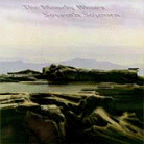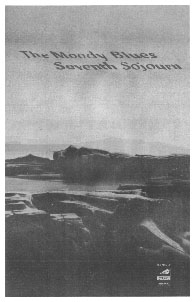![]()
  |

Seventh Sojourn
The Moody Blues
Threshold 7
Released: November 1972
Chart Peak: #1
Weeks Charted: 44
Certified Gold: 11/21/72




 When you get right down to it, the major contribution of the British to rock has been their attention to musical texture. The importance of England's singer-songwriters and British bluesmen can't be denied, but they have simply redefined existing styles. In true sow's ear and silk purse fashion, Her Majesty's finest took the multi-layered sound and distinctive effects made possible by modern recording techniques and created textures as palpable as the clothes on your body -- and almost as organic.
When you get right down to it, the major contribution of the British to rock has been their attention to musical texture. The importance of England's singer-songwriters and British bluesmen can't be denied, but they have simply redefined existing styles. In true sow's ear and silk purse fashion, Her Majesty's finest took the multi-layered sound and distinctive effects made possible by modern recording techniques and created textures as palpable as the clothes on your body -- and almost as organic.
The Kinks are old bleached cotton. Yes sound like carefully-crafted brocade, soft and pliant despite the gold threads running through it. Jethro Tull reminds you of brightly died burlap, and T. Rex of silver lame. And then there's the Moody Blues. The Moodies -- they're thick wool tweed in earth colors, lined with shiny grey silk. They're warm but muted on the outside, sensual and smooth within.
The Moody Blues' seventh visitation on vinyl weaves some new strands into the consistent fabric of their work. The five members of the group seem to share the awareness of worldly problems once only articulated by mellotron wizard Michael Pinder. Some of their lyrics are on a level with "The Eve of Destruction," but they've taken a welcome step away from their often vapid and abstracted writing. Musically, they use rhythmical accents more than before, and even sing something close to out-and-out rock.
 Click image for larger view. |
Now that the Moody Blues are successful singles artists, their new album is a collection of individual tunes with little to link them but the group's collective philosophy. There's a follow-up song about Doctor Tim (remember "Legend of a Mind" with Ray Thomas' haunting refrain, "He's on the outside looking in"?), this time a dirge by Mike Pinder looking forward to "When You're a Free Man." Lead guitarist Justin Hayward, composer of "Nights in White Satin" and the most melodic of the Moodies, continues the group's preoccupation with dreams and fantasy in "The Land of Make Believe" and "New Horizons," the most memorable and sinuous song on the album. Ray Thomas contributes a charming chanty about the search for love on life's sea, "For My Lady." And John Lodge turns in the by-now-familiar "Isn't Life Strange," as well as the Moodies' answer to those who would make sages of them, "I'm Just a Singer (in a Rock and Roll Band)." Gone are the days of "Minstrel's Song" and its optimistic celebration of music's power.
The Moodies' vocal and instrumental harmonies have always been so seductive, why make so much of their pedestrian lyrics? The group itself paid little mind to the words when they didn't even bother to print them on their first two albums, and their early mixes played down the vocals. Only after McKuen's minions were the Moodies regarded as prophets. Their lyrics could be analyzed for their mundane imagery or their representation of a prevailing ethos, but I'd rather leave that to the poets and the clowns. On this album as well as their earlier ones, their most satisfying music is also their most tactile, with a variety of rich and flowering textures. Give your intellect a break. Seventh Sojourn is music to bask in and feel with your pores as well as your ears.
- Steve Ditlea, Rolling Stone, 1-18-73.
Bonus Reviews!
This is one of the best Moody Blues albums so far. As usual, the instrumental work is lithe and responsive, and, also as usual, the performances have clarity and true musicianship. What makes this album stand out is the quality of the songs; almost without exception they are poetic without straining and convey a directness of communication that I haven't heard from the group before. The opening song, "Lost in a Lost World," immediately sets the quietly reflective tone of what's going on here. Perhaps the best track is "Isn't Life Strange," which conveys what seem to be deep personal feelings through an ironic and wistful lyric. The album ends with "I'm Just a Singer (in a Rock and Roll Band)," which is saved from bleakness by the hopeful streak of optimism that runs through this group's work. Tony Clarke's production is splendid, perfectly capturing the intimate atmosphere of a rap session between people of sense and sensitivity. This is a recording worthy of your full attention.
- Peter Reilly, Stereo Review, 4/73.
The sheer delicacy and undiminished beauty of the Moody Blues' eagerly anticipated new album comes as no surprise. There has always been an ethereal, drifting quality that characterized their music. Differing from past efforts in the fact that this is not a conceptual album, there is much to be gained in the listening of "The Land of Make Believe," "New Horizons," "Isn't Life Strange," "I'm Just a Singer (In a Rock & Roll Band)."
- Billboard, 1972.
The group's hardest rocking album, and one that closed their psychedelic period. The songs generally lack the rich Mellotron orchestrations of the earlier records, and most of the songs are built around John Lodge's and Graeme Edge's driving rhythm section -- "New Horizons" was the most romantic number the band had debuted since "Nights in White Satin," while "I'm Just a Singer in a Rock 'n Roll Band" showed the sudden emergence of John Lodge as a major songwriter in the group. * * *
- Bruce Eder, The All-Music Guide to Rock, 1995.
Seventh Sojourn is one of the Moodies' most consistent albums and its last before an extended hiatus. * * * *
- Polly Vedder, Musichound Rock: The Essential Album Guide, 1996.
![]() Reader's Comments
Reader's Comments
No comments so far, be the first to comment.